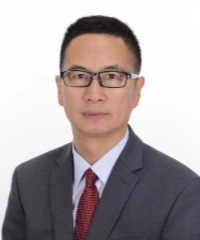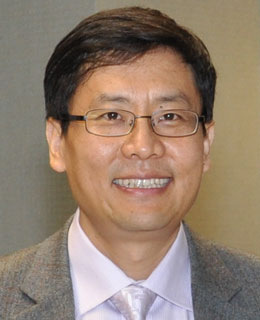Keynote Speakers

Prof. Witold Pedrycz, IEEE Life Fellow, University of Alberta, Canada.
Biography:
Witold Pedrycz (IEEE Life Fellow) is Professor in the Department of
Electrical and Computer Engineering, University of Alberta, Edmonton, Canada. He is also
with the Systems Research Institute of the Polish Academy of Sciences, Warsaw, Poland. Dr.
Pedrycz is a foreign member of the Polish Academy of Sciences and a Fellow of the Royal
Society of Canada. He is a recipient of several awards including Norbert Wiener award from
the IEEE Systems, Man, and Cybernetics Society, IEEE Canada Computer Engineering Medal, a
Cajastur Prize for Soft Computing from the European Centre for Soft Computing, a Killam
Prize, a Fuzzy Pioneer Award from the IEEE Computational Intelligence Society, and 2019
Meritorious Service Award from the IEEE Systems Man and Cybernetics Society. He serves as an
Editor-in-Chief of Information Sciences, Editor-in-Chief of WIREs Data Mining and Knowledge
Discovery (Wiley), and Co-editor-in-Chief of Int. J. of Granular Computing (Springer) and J.
of Data Information and Management (Springer).
His main research directions involve Computational Intelligence, Granular Computing, and
Machine Learning, among others.
Speech Title:
Data Privacy, Energy Awareness, Credibility
and Interpretability of Models: Challenges in Machine Learning
Abstract:
We have been witnessing spectacular
achievements of Machine Learning (ML) with highly visible accomplishments encountered,
in particular, in natural language processing and computer vision impacting numerous
areas of human endeavours. Driven inherently by the technologically advanced learning
and architectural developments, ML is highly impactful coming with far reaching
consequences; just to mention autonomous vehicles, control, health care imaging,
decision-making in critical areas, among others.
We advocate that the design and analysis of ML constructs have to be carried out in a
holistic manner by identifying and addressing a series of central and unavoidable quests
coming from industrial environments and implied by a plethora of requirements of
interpretability, energy awareness (being also lucidly identified on the agenda of green
AI), efficient quantification of quality of ML constructs, their brittleness and
conceptual stability coming hand in hand with the varying levels of abstraction. They
are highly intertwined and exhibit relationships with the technological end of ML. As
such, they deserve prudent attention, in particular when a multicriterial facet of the
problem is considered.
The talk elaborates on the above challenges and identifies the linkages among them. In
the pursuit of coping with such quests, we advocate that Granular Computing can play a
pivotal role offering a conceptual environment and realizing algorithmic development. As
a detailed study, we discuss the ideas of knowledge transfer showing how a thoughtful
and prudently arranged knowledge reuse to support energy-aware ML computing. We discuss
passive and active modes of knowledge transfer. In both modes, the essential role of
information granularity is identified. A generalized scenario of multi-source domains is
discussed. Relational knowledge distillation leading to model compression and model
interpretability is studied.

Prof. Fei Richard Yu, Carleton University, Canada.
Biography:
Prof. F. Richard Yu received the PhD degree
in electrical engineering from the University of British Columbia (UBC) in 2003. His
research interests include cyber-security, connected and autonomous vehicles, artificial
intelligence, blockchain, and wireless systems. He has published 600+ papers in
reputable journals/conferences, 8 books, and 28 granted patents, with 10,000+ citations
(Google Scholar). He received the IEEE TCGCC Best Journal Paper Award in 2019,
Distinguished Service Awards in 2019 and 2016, Outstanding Leadership Award in 2013,
Carleton Research Achievement Awards in 2012 and 2021, the Ontario Early Researcher
Award (formerly Premiers Research Excellence Award) in 2011, the Excellent Contribution
Award at IEEE/IFIP TrustCom 2010, the Leadership Opportunity Fund Award from Canada
Foundation of Innovation in 2009 and the Best Paper Awards at IEEE ICNC 2018, VTC 2017
Spring, ICC 2014, Globecom 2012, IEEE/IFIP TrustCom 2009 and Int'l Conference on
Networking 2005.
He serves on the editorial boards of several journals, including Co-Editor-in-Chief for
Ad Hoc & Sensor Wireless Networks, Lead Series Editor for IEEE Transactions on Vehicular
Technology, IEEE Communications Surveys & Tutorials, and IEEE Transactions on Green
Communications and Networking. He has served as the Technical Program Committee (TPC)
Co-Chair of numerous conferences. He is a ``Highly Cited Researcher" according to Web of
Science since 2019. He is an IEEE Distinguished Lecturer of both Vehicular Technology
Society (VTS) and Comm. Society. He is an elected member of the Board of Governors of
the IEEE VTS and Editor-in-Chief for IEEE VTS Mobile World newsletter. He is a Fellow of
the IEEE, Canadian Academy of Engineering (CAE), Engineering Institute of Canada (EIC),
and Institution of Engineering and Technology (IET).
Speech Title:
Privacy-Preserving Deployment Mechanism for Service Function Chains Across Multiple Domains
Abstract: Network function virtualization (NFV) has attracted attention because of its flexible configuration and management of network functions. Based on NFV, the service function chain (SFC) defines a group of virtual network functions (VNFs) connected sequentially, enabling flexible customization and provisioning of network services. In the large-scale and heterogeneous Internet of Things (IoT) environment, e.g., industrial IoT, servers provided by a single infrastructure provider (InP) cannot support the deployment of all VNFs, and SFCs must be deployed across multiple domains.

Prof. Quan Xue, IEEE Fellow, South China University of Technology, China.
Biography:
Prof. Quan Xue is currently Dean of the School of Microelectronics at South China University of Technology. He is IEEE Fellow, China Overseas High-Level Talent, Member of National 6G Technology R&D General Expert Group, IEEE MTT-S Fellow Evaluating Committee Member, IEEE Distinguished Microwave Lecturer, Director of Guangdong Provincial Key Laboratory of Millimeter-Wave and Terahertz, Part-time Chief Scientist at 2012 Labs, Huawei Technologies. His research fields include microwave/millimeter-wave/terahertz integrated circuit (IC), circuit, antenna, package and systems. He is the principal investigator of over 20 major research programs, including National Key Research and Development Program, Key-Area Research and Development Program of Guangdong Province etc. He has published over 400 SCI-indexed papers and received over 13,000 citations (by Scopus, excluding self-citation). He was granted over 20 China patents and about 30 US patents (5 among them have been assigned to US companies). He was awarded the second prize of National Technology Invention Award, The first prize of Guangdong Science and Technology Award, and the IEEE AP-S 2017 Harold A. Wheeler Applications Prize Paper Award.
Speech Title:
Near-Field MIMO Communications for 6G: Fundamentals, Challenges, Potentials, and Future Directions
Abstract: Extremely large-scale antenna array (ELAA) is a common feature of several key candidate technologies for sixth generation (6G) mobile networks, such as ultra-massive multiple-input-multiple-output (UM-MIMO), cell-free massive MIMO, reconfigurable intelligent surface (RIS), and terahertz communications. Since the number of antennas is very large for ELAA, the electromagnetic radiation field needs to be modeled by near-field spherical waves, which differs from the conventional planar-wave-based radiation model of 5G massive MIMO. As a result, near-field MIMO communications will become essential in 6G wireless networks.

Prof. Song Guo, IEEE Fellow, ACM Distinguished Member, The Hong Kong Polytechnic University.
Biography:
Prof. Song Guo is a Full Professor leading
the Research Group of Networking and Mobile Computing at the Department of Computing,
The Hong Kong Polytechnic University. He also holds a Changjiang Chair Professorship
awarded by the Ministry of Education of China. Prof. Guo is a Fellow of the Canadian
Academy of Engineering (FCAE), Fellow of the IEEE (FIEEE), and Member of Academia
Europaea (MAE). He is the current Editor-in-Chief of IEEE Open Journal of the Computer
Society.
Prof. Guo is the founding director of the Edge Intelligence Lab at The Hong Kong
Polytechnic University (PEIL). His research interests are mainly in edge AI, 6G, big
data and machine learning, mobile computing, and distributed systems. Prof. Guo's
research has been sponsored by RGC, NSFC, ITF, MOST, NRC, JSPS, MIC, JST, industry, etc.
He published many papers in top venues with wide impact in these areas and was
recognized as a Highly Cited Researcher (Clarivate Web of Science). He is the recipient
of the 2020 Best Paper Award for IEEE Transactions on Computers, 2019 IEEE TCBD Best
Conference Paper Award, 2018 IEEE TCGCC Best Magazine Paper Award, 2019 & 2017 IEEE
Systems Journal Annual Best Paper Award, and other 8 Best Paper Awards from IEEE/ACM
conferences. He also received the Faculty Award for Outstanding Achievement in Research
and Scholarly Activities twice.
Prof. Guo served for IEEE Communications Society as a Distinguished Lecturer, Member of
Board of Governors, Director of Membership Services, and Chair of Technical Committee of
Space and Satellite Communications. He has also served for IEEE Computer Society on
Fellow Evaluation Committee, Transactions Operations Committee, Steering Committee of
IEEE Transactions on Cloud Computing, Editor-in-Chief Search Committee, etc. Prof. Guo
has been named on editorial board of a number of prestigious international journals like
IEEE Transactions on Computers, IEEE Transactions on Parallel and Distributed Systems,
IEEE Transactions on Cloud Computing, IEEE Transactions on Emerging Topics in Computing,
IEEE Transactions on Sustainable Computing, ACM Computing Surveys, IEEE Internet of
Things Journal, etc. He has also served as chair of organizing and technical committees
of numerous international conferences. Prof. Guo is a frequently invited expert for
various national and international grant reviews. He is currently on RGC engineering
panel.
Speech Title:
Intelligence-Endogenous Management Platform for Computing and Network Convergence
Abstract: Massive emerging applications are driving demand for the ubiquitous deployment of computing power today. This trend not only spurs the recent popularity of the Computing and Network Convergence (CNC), but also introduces an urgent need for the intelligentization of a management platform to coordinate changing resources and tasks in the CNC.I will present the concept of an intelligence-endogenous management platform for CNCs called CNC brain based on artificial intelligence technologies. It aims at efficiently and automatically matching the supply and demand with high heterogeneity in a CNC via four key building blocks, i.e., perception, scheduling, adaptation, and governance, throughout the CNC’s life cycle.
